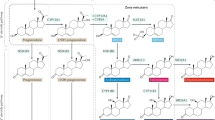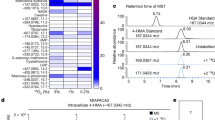Abstract
AMONG the naturally occurring steroid hormones and metabolites the androgens are unique in that 3-hydroxy-5α-androstanes exhibit high hormonal activity, the 3α-hydroxy (axial) compounds being highly active while the 3β-hydroxy (equatorial) compounds are much weaker androgens. It is known from both chemical and microbiological work1 that the 3α-alcohols are oxidized more readily to the corresponding 3-ketone than are the 3β-alcohols, in accordance with the thermodynamic prediction. It is further known that enzymic oxidation of 3-hydroxy-5α-androstanes occurs in mammalian tissue, in particular in the liver. This suggests the possibility that in vivo these compounds are oxidized in various degrees to the even more potent androgens, the 3-keto-5α-androstanes, and that, in fact, the 3-alcohols may be androgenically inactive per se.
This is a preview of subscription content, access via your institution
Access options
Subscribe to this journal
Receive 51 print issues and online access
$199.00 per year
only $3.90 per issue
Buy this article
- Purchase on Springer Link
- Instant access to full article PDF
Prices may be subject to local taxes which are calculated during checkout
Similar content being viewed by others
References
Talalay, P., Physiol. Rev., 37, 371 (1957).
Wiberg, K. B., Chem. Rev., 55, 713 (1955).
Rosemberg, E., Dorfman, A. S., and Dorfman, R. I., Endocrinol., 67, 116 (1960).
Bollinger, F. W., and Wendler, N. L., J. Org. Chem., 24, 1139 (1959).
Author information
Authors and Affiliations
Rights and permissions
About this article
Cite this article
RINGOLD, H., BURSTEIN, S. & DORFMAN, R. A Biochemical Effect of Deuterium. Nature 191, 1294–1295 (1961). https://doi.org/10.1038/1911294a0
Issue Date:
DOI: https://doi.org/10.1038/1911294a0
Comments
By submitting a comment you agree to abide by our Terms and Community Guidelines. If you find something abusive or that does not comply with our terms or guidelines please flag it as inappropriate.



